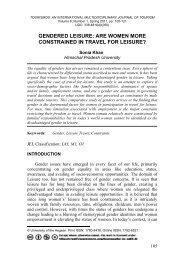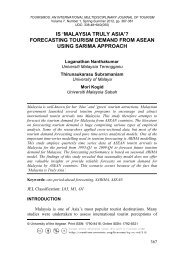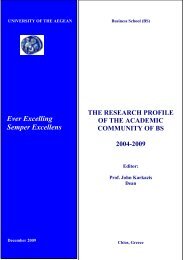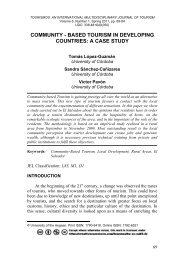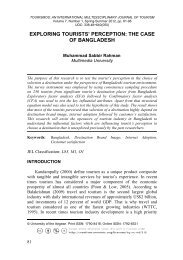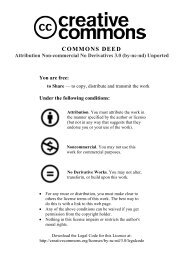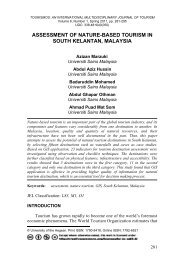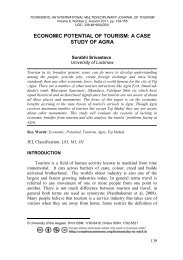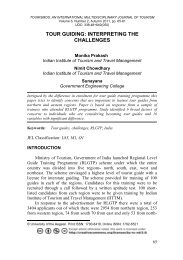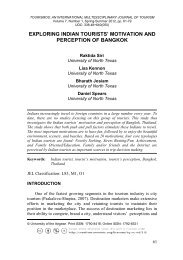TOURISMOS is an international, multi-disciplinary, refereed (peer ...
TOURISMOS is an international, multi-disciplinary, refereed (peer ...
TOURISMOS is an international, multi-disciplinary, refereed (peer ...
You also want an ePaper? Increase the reach of your titles
YUMPU automatically turns print PDFs into web optimized ePapers that Google loves.
<strong>TOURISMOS</strong>: AN INTERNATIONAL MULTIDISCIPLINARY JOURNAL OF TOURISM<br />
Volume 6, Number 1, Spring 2011, pp. 84-104<br />
UDC: 338.48+640(050)<br />
Ethical Dec<strong>is</strong>ion-making<br />
In the related literature, dec<strong>is</strong>ion-making <strong>is</strong> defined as a process<br />
which has a starting point <strong>an</strong>d in which different work, activity or<br />
opinions follow each other beginning from point <strong>an</strong>d which ends with a<br />
choice to be made. The most accepted approach on dec<strong>is</strong>ion-making <strong>is</strong> the<br />
traditional model with five stages. Here (Koçel, 2001, p. 53; Özalp, 1996,<br />
p. 359-363); the first thing <strong>is</strong> to determine the aim or to define the<br />
problem, then the priorities are specified, the relev<strong>an</strong>t alternatives are put<br />
forth <strong>an</strong>d, after evaluation, the most appropriate alternative <strong>is</strong> chosen<br />
(Maviş, 2006, p. 135). As it <strong>is</strong> seen above, the dec<strong>is</strong>ion-making <strong>is</strong> a<br />
considerably extensive process cons<strong>is</strong>ting of stages complementing each<br />
other. Th<strong>is</strong> process has to be conducted no matter what the kind or the<br />
quality of the dec<strong>is</strong>ion taken <strong>is</strong>. For that reason, the traditional (general)<br />
dec<strong>is</strong>ion-making process should be applied while making ethical<br />
dec<strong>is</strong>ions as it <strong>is</strong> so in other dec<strong>is</strong>ion-making activities.<br />
Ethical dec<strong>is</strong>ion-making <strong>is</strong> a subject attracting great attention in the<br />
literature on work ethics. A great number of researchers have developed a<br />
variety of conceptual models aimed at explaining or predicting the<br />
process in which a m<strong>an</strong>ager makes <strong>an</strong> ethical dec<strong>is</strong>ion. Among these<br />
ethical dec<strong>is</strong>ion-making models, Kohlberg’s (1969) Cognitive Moral<br />
Developmental Model, Ferrel <strong>an</strong>d Gresham’s (1985) Probability Model in<br />
Dec<strong>is</strong>ion-Making, Hunt <strong>an</strong>d Vitell’s (1986) General Theory of Marketing<br />
Ethics c<strong>an</strong> be l<strong>is</strong>ted. Apart from them, Trevino’s (1986) Interaction of<br />
Individual-Situational Factors Model <strong>an</strong>d Jones’ (1991) Moral Density<br />
Model c<strong>an</strong> be taken into consideration. None of these models asserted <strong>an</strong><br />
applied working base directed toward the ethical dec<strong>is</strong>ion-making<br />
process, rather they remained limited to the testing of these theories<br />
(Trevino, 1986; Ford ve Richardson, 1994, p. 205). In general, ethical<br />
dec<strong>is</strong>ion-making models divide the individuals’ assumed effects on<br />
dec<strong>is</strong>ion behaviour into two broad categories (see. The study of<br />
conceptual models; Jones, 1991; R<strong>an</strong>dall <strong>an</strong>d Gibson, 1990). The first one<br />
includes the variables combined with <strong>an</strong> individual dec<strong>is</strong>ion-maker. The<br />
second one, on the other h<strong>an</strong>d, shapes the content of the variables in<br />
individual dec<strong>is</strong>ion-making <strong>an</strong>d explains the situation (Ford ve<br />
Richardson, 1994, p. 205-206).<br />
Another ethical dec<strong>is</strong>ion-making model <strong>is</strong> Kohlberg’s (1969)<br />
Cognitive Moral Development Model. Here, moral development <strong>is</strong><br />
determined by three levels including a gradually developing moral<br />
underst<strong>an</strong>ding <strong>an</strong>d two stages in each level (Kağıtçıbaşı, 2005, p. 334).<br />
These levels are preconventional, conventional <strong>an</strong>d postconventional<br />
89



